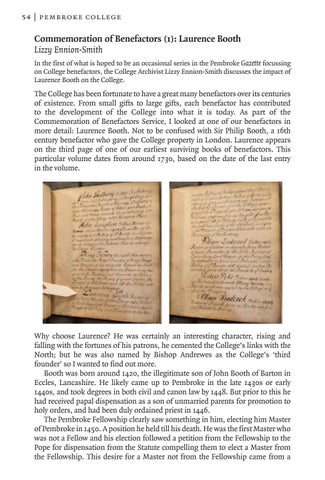54 | pembroke college
Commemoration of Benefactors (1): Laurence Booth Lizzy Ennion-Smith In the first of what is hoped to be an occasional series in the Pembroke Gazette focussing on College benefactors, the College Archivist Lizzy Ennion-Smith discusses the impact of Laurence Booth on the College.
The College has been fortunate to have a great many benefactors over its centuries of existence. From small gifts to large gifts, each benefactor has contributed to the development of the College into what it is today. As part of the Commemoration of Benefactors Service, I looked at one of our benefactors in more detail: Laurence Booth. Not to be confused with Sir Philip Booth, a 16th century benefactor who gave the College property in London. Laurence appears on the third page of one of our earliest surviving books of benefactors. This particular volume dates from around 1730, based on the date of the last entry in the volume.
Why choose Laurence? He was certainly an interesting character, rising and falling with the fortunes of his patrons, he cemented the College’s links with the North; but he was also named by Bishop Andrewes as the College’s ‘third founder’ so I wanted to find out more. Booth was born around 1420, the illegitimate son of John Booth of Barton in Eccles, Lancashire. He likely came up to Pembroke in the late 1430s or early 1440s, and took degrees in both civil and canon law by 1448. But prior to this he had received papal dispensation as a son of unmarried parents for promotion to holy orders, and had been duly ordained priest in 1446. The Pembroke Fellowship clearly saw something in him, electing him Master of Pembroke in 1450. A position he held till his death. He was the first Master who was not a Fellow and his election followed a petition from the Fellowship to the Pope for dispensation from the Statute compelling them to elect a Master from the Fellowship. This desire for a Master not from the Fellowship came from a












